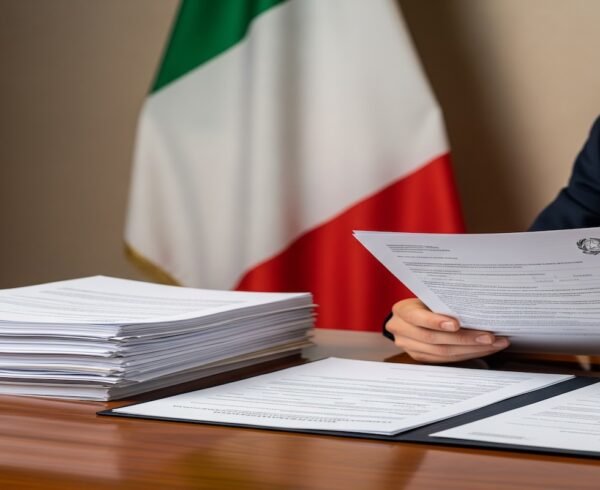Update to 2025
In relation to the matter of obtaining Italian Citizenship by Descent Great-Grandparent, some novelties are contained in the bill filed at the Senate last June. Find out the detailed new rules on Italian citizenship proposed in the Senate at this link.
How to get italian citizenship by descent if my great grandparents are Italian
Currently, the requirements for obtaining Italian citizenship through descent from your great-grandparents include being descended from an Italian ancestor who emigrated to America. From the moment the ancestor set foot in America, neither he nor his descendants should have ever lost Italian citizenship. In practice, Italian citizenship must have been transmitted from the ancestor to the next generation up to the last one requesting recognition based on the right of citizenship through naturalization iure sanguinis.
Documents needed for italian citizenship by descent
Documents needed for Italian citizenship by descent include the extract of the birth record from the municipality in Italy where the Italian ancestor was born, birth certificates of all descendants from the emigrated ancestor including the person applying for Italian citizenship, the emigration certificate of the emigrated great-grandfather, and a certificate from the Italian consulate to prove that none of the descendants have ever renounced Italian citizenship. All documents must be authentic and officially translated into Italian language
Changes to italian citizenship by descent. The main points of the new proposal for obtaining citizenship iure sanguinis
The three main points of the new proposal to obtain citizenship iure sanguinis by descent from Italian emigrants since 1860 are part of a bill containing new proposals aimed at Italian citizens living abroad, and are:
- Electronic vote for Italian citizens residing abroad.
- Facilitations for the recovery of citizenship for Italians who have naturalised in another country and lost it.
- New requirements for descendants of Italians who intend to obtain Italian citizenship through genealogical reconstruction.
The hypotheses envisaged in the draft law on new Requirements for applicants the citizenship by descent of Italian emigrants
The third point is the fundamental one. New requirements are being proposed for descendants of Italians who wish to obtain Italian citizenship through genealogical reconstruction. The three main requirements are:
- Being of Italian descent up to the third generation and no further;
- Having a B1 level Italian language diploma;
- Residing in Italy for at least one year before applying for citizenship.
According to statements made by the government, the new reform aims at implementing rules that recognise and enhance the identity and awareness of Italian-ness.
The need to regulate the citizenship process. The difficulties of Italian consulates faced with citizenship applications
The main problem with the recognition of Italian citizenship for the descendants of Italians who have emigrated abroad, especially to the United States, Argentina, Peru, Venezuela, Brazil, Uruguay, Colombia and Mexico, relates to the overcrowding of pending applications at Italian consulates in countries with the highest density of emigration from Italy. At these consulates, citizenship applications from Italian descendants are very numerous. The reform proposal, therefore, aims to restore the principle of legality in relation to the recognition of citizenship, which the high number of citizenship applications threatens to disregard.
The procedure to request italian citizenship to court in Italy
The increase in requests for Italian citizenship by descendants of Italian emigrants in America has led to a surge in applications, causing backlogs at consulates. Consequently, many have turned to the Italian courts to claim their right to citizenship through jure sanguinis by descent. Judicial recognition of Italian citizenship by descent in Italy is often the only solution for overcoming the difficulties associated with lengthy waiting lists at Consulates, which do not recognize applicants the right to citizenship. In this mood, the only way to obtain Italian Citizenship is to contact an Immigration Lawyer and bring an action to an Italian Court. Thanks to the numerous and prestigious collaborations of our Law Firm expert in Immigration Law, we can take care of the procedure for the recognition of the right to citizenship by descent directly before the Judge in Italy.
Request for residence permit pending recognition of citizenship by descent
Another possibility to speed up the process of obtaining the italian passport by descent by a person entitled to recognition of citizenship by is to:
- Contact a lawyer expert in citizenship law in Italy to obtain the exact list of documents to be produced in the homeland for the recognition of citizenship by descent;
- Enter Italy with a tourist visa;
- Submit the paperwork to the municipality of residence in Italy;
- Apply for a residence permit while awaiting recognition of the right to citizenship jby descent.
In practice, the subject entitled, instead of submitting the application for recognition of citizenship by descent to the Italian consulate in the country of residence, submits it directly in Italy to the Municipality where they wish to apply for residence.
The Impact of the New Proposal on the Procedures for the Recognition of Italian Citizenship by Descent
A B1-level Italian certificate and residence in Italy for at least one year are the new requirements contained in the proposal, without which Italian citizenship can no longer be obtained. Knowledge of the Italian language and residence in Italy for a minimum of one year are intended to strengthen the link with Italy on the part of the descendants of former emigrants, thanks to which they can be naturalised as Italians.
The approval of the reform with its new requirements for applying for citizenship iure sanguinis could have several implications for those seeking Italian naturalisation:
- Reduction in the number of applications: the requirement to reside in Italy for one year and to have a B1 level of Italian could lead to a significant reduction in the number of applications.
- Exclusion of 4th and 5th generation descendants: by limiting eligibility to the third generation, those with Italian great-grandparents or great-great-grandparents would be excluded from the process, affecting a large number of potential applicants.
- Trial congestion: if the law is approved with the new procedures, there will probably be an increase in court cases for the recognition of citizenship iure sanguinis.
We recall, in fact, that thanks to a recent ruling by the Court of Cassation in relation to a case of naturalisation of an Italian immigrant in Brazil, all emigrants were also recognised as citizens of the South American country, and obtaining Italian citizenship through a court case is much faster than applying for recognition at the consulate.
Acquisition of Italian citizenship by maternal descent
The reform does not change the requirements for acquiring Italian citizenship by maternal descent. In these cases, the difference between a matrilineal ascendant born before 1948 and after 1948 remains valid. In cases of citizenship request by descent by an Italian mother born before 1948, the acquisition of citizenship must be requested through the Civil Court of Rome
Italian citizenship loophole. The through italian citizenship by descent new ruling
Contact our expert international law firm for the recognition of Italian citizenship iure sanguinis
6 questions and answers for Italian Citizenship by Descent of Italian emigrants
Check your requirements to become an Italian citizen and verify by filling out the contact form
Question: Was your father an Italian citizen when you were born?
- Answer: Yes, my father was an Italian citizen when I was born and he did not naturalize as a citizen of any other country.
Question: Was your mother an Italian citizen when you were born? Did she naturalize as a citizen of the United States or any other country?
- Answer: Yes, my mother was an Italian citizen when I was born and she did not naturalize as a citizen of the United States or any other country. Additionally, I was born after January 1, 1948.
Question: Was your father born in Italy?
- Answer: No, my father was not born in Italy, but his father or mother (my paternal grandfather or grandmother) were born in Italy and were Italian citizens or had the right to Italian citizenship by jure sanguinis when my father was born.
Question: Was your mother born in Italy?
- Answer: No, my mother was not born in Italy, but her father or her mother, that is to say, my maternal grandfather or grandmother were born in Italy and were Italian citizens or had the right to Italian citizenship by jure sanguinis when my mother was born. My birthdate is after January 1, 1948.
Question: Was your paternal or maternal grandfather born in Italy?
- Answer: No, my paternal or maternal grandfather was not born in Italy. However, my maternal and paternal great-grandparents were born in Italy and were Italian citizens or had the right to Italian citizenship by jure sanguinis at the time of my grandparents’ birth.
Question: Was your paternal or maternal great-grandfather born in Italy?
- Answer: No, my paternal or maternal great-grandfather was not born in Italy. My great-great-grandparents on both maternal and paternal sides were born in Italy and were Italian citizens or had the right to Italian citizenship by jure sanguinis when my great-grandparents were born.
Italian Citizenship by Descent Great-Grandparent: Join the Class Action to request access to
Frequently Asked Questions about Italian Citizenship via Judicial Process:
Question: Who can apply for Italian citizenship via judicial process?
Answer: Italian citizenship via judicial process can be requested by descendants of Italian citizens who emigrated after 1861 when the citizenship application is denied or when the consulate takes too long to respond to the request.
Question: What documents are needed for the application of Italian citizenship by descent?
Answer: Applicants must prove uninterrupted descent from an Italian citizen by providing documents that certify the ancestor’s Italian citizenship and subsequent birth, marriage, and death records of the descendants.
Question: How does the judicial process for Italian citizenship work?
Answer: The process can be initiated without traveling to Italy by filing a petition with the Civil Court of Rome or the Regional Administrative Tribunal (TAR) to recognize subjective rights or legitimate interests.
Question: What are the waiting times to obtain Italian citizenship?
Answer: Waiting times vary. Consulate waiting lists can be very long, up to 10 years. However, the law requires the Italian Administration to respond within 2 years of the application submission. With a court appeal, the times are much faster.
Question: Is it possible to obtain Italian citizenship through the maternal line?
Answer: Yes, following a 1948 Court of Cassation ruling, it is possible to reclaim Italian citizenship through the maternal line for descendants before 1948. This can be done via a petition to the Civil Court of Rome.
Contact our expert international law firm for the recognition of Italian citizenship iure sanguinis
















